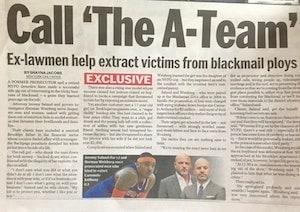Substitute for Experience,
Knowledge & Advocacy
Whether you are the victim of Extortion by a woman you met at a bar or a website online, or you are accused of Blackmail and find yourself under arrest by the NYPD and in handcuffs, there are few crimes that expose both parties – the complainant and defendant – to public humiliation and familial shame. While crimes in New York involving Grand Larceny routinely center around the value of the theft or property illegally taken, such as an Embezzlement scheme, this subset of offenses is significantly more complicated and demands the advocacy of a Blackmail lawyer irrespective of which side of the justice system you find yourself. Because the Penal Law provides prosecutors with the ability to charge an accused with a felony no matter the scenario, it is imperative that you understand the legal code to best protect yourself.
NYS Blackmail & Extortion Crimes: FAQ



Extortion, the proper legal term for Blackmail, is defined in New York Penal Law 155.05(2)(e). In general terms, if you compel, intimidate, frighten or coerce another person to give you property (usually, but not necessarily, money) under duress, you have likely satisfied the first element of this offense. Coupled with this behavior, the targeted party must give you the property you seek because he or she fears that you or another person will commit a specific act. Some of the more common examples of the acts delineated in NY PL155.05(2)(e) are as follows:
Even if your conduct or the actions of your harasser do not fall within the enumerated threats, if the claim is that you or this person will behave in a manner that will not benefit the actor materially and at the same time it is calculated to significantly harm another’s personal relationships, business, health, career or finances, then it is likely you violated the law. Again, once this legal threshold is met and elements satisfied, the District Attorney can charge a felony and present a case to the Grand Jury regardless of the monies ultimately stolen through these means.
Degrees of Extortion
Assuming law enforcement can establish this foundation, the follow up issue or question turns to the degree of the crime. Fourth Degree Grand Larceny, NY Penal Law 155.30(6), is the generic and automatic felony referenced above. This offense is a class “E” felony and occurs when a targeted person turns over property no matter if it is worth $1 or $1 million.
A significantly more serious offense, Second Degree Grand Larceny, NY Penal Law 155.40(2), is a class “C” felony. While a threat to damage that person’s property can raise the severity of the crime, the “classic” way it is perpetrated is where there is a threat to cause a physical injury if the property or monies is not turned over. This physical injury need not be life altering or ending but as little as to break a finger, busted a lip or even just an old school punch in the gut is sufficient.
Outside of the above two degrees, the severity of these acts are gauged just as any other value based Grand Larceny crime. The benchmark is whether the value taken is more than $1,000.00, $3,000.00, $50,000.00 or $1 million. The corresponding crimes are the class “E” felony in the Fourth, class “D” felony in the Third, class “C” in the Second, and class “B” felony in the First Degree.
The last factor that impacts the ultimate charge is whether you are successful or not in wrongfully securing the monies. Should you fail, but made significant attempts, prosecutors still have grounds to arrest and pursue you in a court proceeding. Instead of being charged with the completed offense, for example, Third Degree Grand Larceny, the attempted crime decreases one degree. As such, in this scenario, the class “D” would become a class “E” felony with the associated punishment and penalties.
The sentencing guidelines for White Collar crimes including Extortion are all the same. A first time violator may not face mandatory incarceration unless the theft exceeds $1 million but by no means does that mean he or she won’t get thrown in jail or prison. Although a judge may sentence a first time offender to probation, some type of conditional discharge, fines and even community service, the potential for incarceration is very real.
While the above sentencing guidelines are applicable to those with no criminal history, a “predicate felon” faces mandatory imprisonment on every conviction. Period.
There are times when you may run afoul of the law without being aware of your illegal conduct. Similarly, you may be the victim of an extorter without knowing how to protect yourself and the technicalities of the wrongdoing. The following are generic scenarios that may share some characteristics with your situation.
Affairs, Lovers, and Similar Schemers
A common predicament faced by more than a few Saland Law clients, this type of Blackmail occurs where a former lover from SeekingArrangement.Com, AshleyMadison.Com, or sexual partner met socially or through a business event now seeks “hush” money. For example, knowing you won’t leave your wife, or knowing that your lover won’t leave his spouse, the non-married party demands $25,000.00, payments to rent an apartment, a car, or other property or money. Even if the entire “money grab” is a scheme irrespective of whether the marriage remains intact, if the married man refuses to pay the girlfriend will expose the affair to the spouse and employer partners. Ultimately, whether it was a one night fling or nothing intimate occurred because the story is just contrived lies, the man acquiesces and pays.
Business Associates, Colleagues and Other Professional
Although often couched as a business issue and a civil dispute, the former Manhattan prosecutors at Saland Law have represented clients where completely fictitious allegations are made by a business partner or employee where that person demands extra payment, a severance or some other compensation. If the target refuses, he or she will make false reports of tax issues, spread rumors about the business or person, or take some other action that is meritless but calculated to harm the company or colleague. Again, due to a fear of adverse consequences to the business, the victim ponies up the monies to keep the falsehood quiet.
Far from atypical, the above two very generic scenarios are only two of many situations that are common to these felonious illegalities.
Are you committing a Grand Larceny by Extortion if you scare your neighbor into paying a debt by threatening to tell his wife he is having an affair? Have you committed a crime if you have a video of a drunk celebrity and demand payment for that recording in lieu of turning it over to a television station? Alternatively, have you set yourself up for prosecution if you threaten to report a person to the police if they do not repay you after they damaged your property? No matter the evidence and actions, exposure to both parties is great. Whether you are a victim or the accused, whether you have a practical or statutory defense, the steps you take now may, and likely will, have a direct and real impact on your future.
Both inside and outside the courtroom, arm yourself with legal counsel knowledgeable about and experienced in the practical application of New York Blackmail laws. If you are the victim of this conduct, the target of a stalker, or on the receiving end of coercive behaviors, you can seize control and make your harasser rue the day he or ever she went on the offensive. Alternatively, if are accused by a jilted lover, an angry former colleague or employee, or any person who is embellishing with misinformation, you too can secure justice and ensure your life is not overrun by malicious claims.
Saland Law’s criminal defense team and victim advocates, founded by two former Assistant District Attorneys including the lead prosecutor of former NBA All Star Carmelo Anthony’s blackmailers, are not merely prepared but have the skill to navigate your case. The next steps are yours to make. Take them and your life back now.
Call our New York defense attorneys and victim advocates at (212) 312-7129 or Contact Us Online Today.